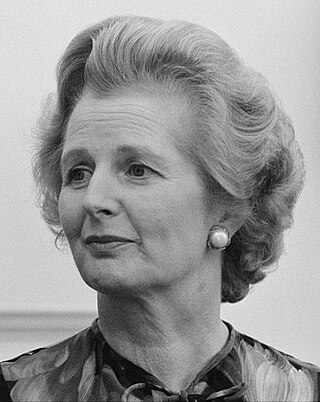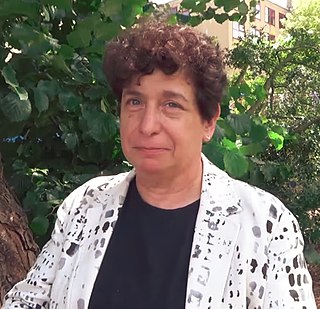This bibliography includes major books and articles about British prime minister Margaret Thatcher and her policies in office.
{{cite book}}: CS1 maint: postscript (link)Economics is a social science that studies the production, distribution, and consumption of goods and services.

Margaret Hilda Thatcher, Baroness Thatcher, was a British stateswoman and Conservative politician who served as Prime Minister of the United Kingdom from 1979 to 1990 and Leader of the Conservative Party from 1975 to 1990. She was the longest-serving British prime minister of the 20th century and the first woman to hold the position. As prime minister, she implemented economic policies known as Thatcherism. A Soviet journalist dubbed her the "Iron Lady", a nickname that became associated with her uncompromising politics and leadership style.

The 1979 United Kingdom general election was held on Thursday 3 May 1979 to elect 635 members to the House of Commons.

Thatcherism is a form of British conservative ideology named after Conservative Party leader Margaret Thatcher that relates to not just her political platform and particular policies but also her personal character and style of management while in office. Proponents of Thatcherism are referred to as Thatcherites. The term has been used to describe the principles of the British government under Thatcher from the 1979 general election to her resignation in 1990, but it also receives use in describing administrative efforts continuing into the Conservative governments under John Major and David Cameron throughout the 1990s and 2010s. In international terms, Thatcherites have been described as a part of the general socio-economic movement known as neoliberalism, with different countries besides the United Kingdom sharing similar policies around expansionary capitalism.
One-nation conservatism, also known as one-nationism or Tory democracy, is a paternalistic form of British political conservatism. It advocates the preservation of established institutions and traditional principles within a political democracy, in combination with social and economic programmes designed to benefit the ordinary person. According to this political philosophy, society should be allowed to develop in an organic way, rather than being engineered. It argues that members of society have obligations towards each other and particularly emphasises paternalism, meaning that those who are privileged and wealthy should pass on their benefits. It argues that this elite should work to reconcile the interests of all social classes, including labour and management, rather than identifying the good of society solely with the interests of the business class.
International political economy (IPE) is the study of how politics shapes the global economy and how the global economy shapes politics. A key focus in IPE is on the distributive consequences of global economic exchange. It has been described as the study of "the political battle between the winners and losers of global economic exchange."
The national interest is a sovereign state's goals and ambitions, taken to be the aim of government.

John Leonard Eatwell, Baron Eatwell, is a British economist who was President of Queens' College, Cambridge, from 1996 to 2020. A former senior advisor to the Labour Party, Lord Eatwell sat in the House of Lords as a non-affiliated peer from 2014 to 2020, before returning to the Labour bench.

Iain Dale is a British broadcaster, author, political commentator, and politician, and a former publisher and book retailer. He has been a blogger since 2002. He was the publisher of the Total Politics magazine between 2008 and 2012, and the managing director of Biteback Publishing until May 2018. Since September 2010, he has hosted a regular discussion show on the radio station LBC. He was named Radio Presenter of the Year at the Arqiva Commercial Radio Awards in 2013 and 2016. In May 2024, he announced that he was quitting his LBC roles to run as an MP in the 2024 United Kingdom general election.

Carole Pateman FBA FAcSS FLSW is a feminist and political theorist. She is known as a critic of liberal democracy and has been a member of the British Academy since 2007.
Dennis Kavanagh is a British political analyst and since 1996 has been Professor of Politics at the University of Liverpool, and now Emeritus Professor. He has written extensively on post-war British politics. With David Butler, he wrote the series of books on British general elections, such as The British General Election of 2010, and most recently, The British General Election of 2015.

Sir Ivor Martin Crewe DL FAcSS was until 2020 the Master of University College, Oxford, and President of the Academy of Social Sciences. He was previously Vice-Chancellor of the University of Essex and also a Professor in the Department of Government at Essex.
Archibald Haworth Brown, is a British political scientist. In 2005, he became an emeritus professor of politics at the University of Oxford and an emeritus fellow of St Antony's College, Oxford, where he served as a professor of politics and director of St Antony's Russian and East European Centre. He has written widely on Soviet and Russian politics, on communist politics more generally, on the Cold War, and on political leadership.

Margaret Thatcher's term as the Prime Minister of the United Kingdom began on 4 May 1979 when she accepted an invitation of Queen Elizabeth II to form a government, and ended on 28 November 1990 upon her resignation. She was elected to the position in 1979, having led the Conservative Party since 1975, and won landslide re-elections in 1983 and 1987. She gained intense media attention as Britain's first female prime minister, and was the longest-serving British prime minister of the 20th century. Her premiership ended when she withdrew from the 1990 Conservative leadership election. While serving as prime minister, Thatcher also served as the First Lord of the Treasury, the Minister for the Civil Service and the Leader of the Conservative Party.
Colin Hay is Professor of Political Sciences at Sciences Po, Paris and Affiliate Professor of Political Analysis at the University of Sheffield, joint editor-in-chief of the journal Comparative European Politics. and Managing Editor of the journal New Political Economy.
Demographic economics or population economics is the application of economic analysis to demography, the study of human populations, including size, growth, density, distribution, and vital statistics.
In economics, non-convexity refers to violations of the convexity assumptions of elementary economics. Basic economics textbooks concentrate on consumers with convex preferences and convex budget sets and on producers with convex production sets; for convex models, the predicted economic behavior is well understood. When convexity assumptions are violated, then many of the good properties of competitive markets need not hold: Thus, non-convexity is associated with market failures, where supply and demand differ or where market equilibria can be inefficient. Non-convex economies are studied with nonsmooth analysis, which is a generalization of convex analysis.
Raia Prokhovnik, is Reader in Politics at the Open University's Faculty of Social Sciences, for their Department of Politics and International Studies, and founding editor of the journal Contemporary Political Theory. She is the chair of the OU's interdisciplinary politics module, Living political ideas, and contributed to other modules including Power, dissent, equality: understanding contemporary politics.

Razmik Panossian is a Canadian-Armenian historian and political scientist.

Joan Claire Tronto, is professor of political science at the University of Minnesota, and was previously professor of women's studies and political science at Hunter College and the Graduate School, City University of New York.